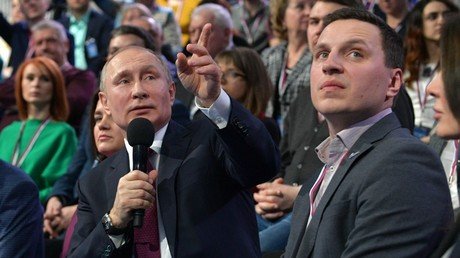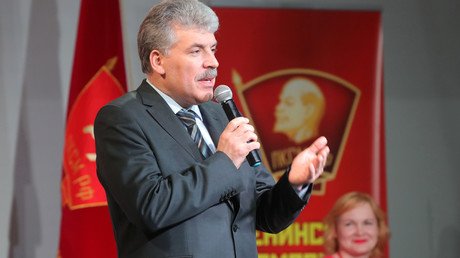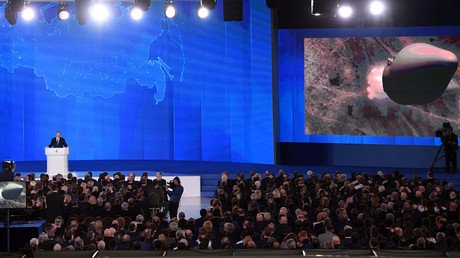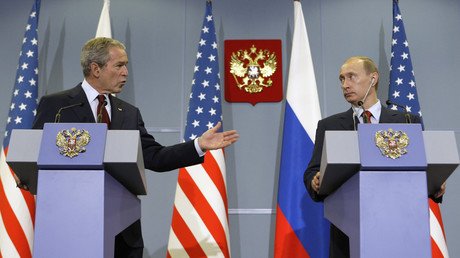Your guide to the 2018 Russian presidential election candidates: 2. Vladimir Putin (Independent)
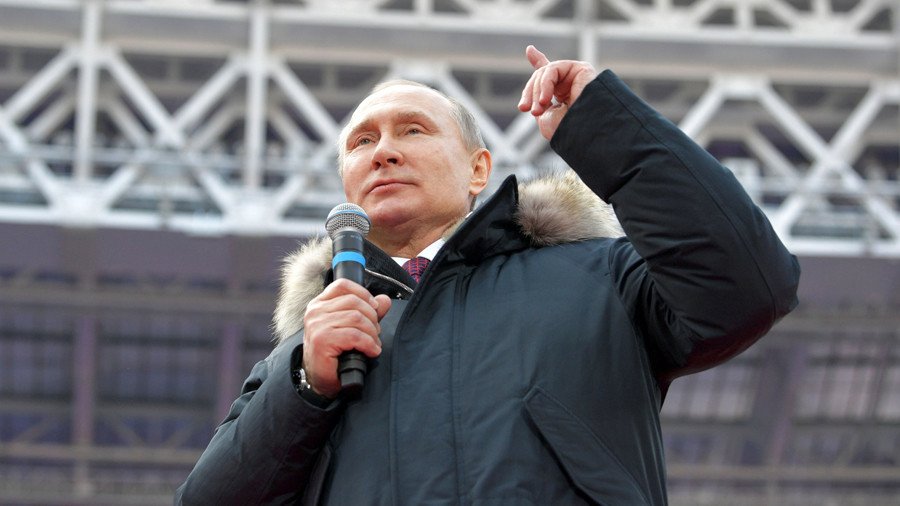
Russians will vote for a new president on March 18, with seven challengers facing Vladimir Putin. RT is previewing the election this month, and the second featured candidate is the incumbent himself.
Who? - Vladimir Putin.
Party? - None this time around. Instead, he's running as an Independent. However, he has the tacit support of United Russia, which is chaired by former president Dmitry Medvedev. The group is the largest faction in Russia's Duma (parliament).
What is his background? - Putin needs little introduction. He's been Russia's head of state for 14 of the past 18 years, and had a brief stint as prime minister before that. The incumbent president served as a KGB agent during the Soviet era, when he was stationed in Dresden, Germany for a long period.
By 1991, as modern Russia emerged from the ashes of the USSR, Putin was working for a pro-democracy movement in Leningrad (now St. Petersburg). He then spent half of the decade as an assistant to Anatoly Sobchak, the first freely elected mayor of the city. After Sobchak failed in his bid for re-election in 1996, Putin moved to Moscow where he soon became deputy chief of Boris Yeltsin's presidential staff. Within a few years, the ailing Yeltsin had anointed Putin as his successor.
Does he have political experience? - Plenty. Putin inherited a Russia which was very obviously on its knees. The country had defaulted on its international debt in 1998, with citizens meagre savings wiped out, while a disastrous war raged in the Chechnya region. Putin quickly ended the conflict and stabilised the economy, helped by rising resource prices, especially in oil and gas. He also reasserted state control of vital sectors, which irked many in the West.
In his second term (2004-2008), Putin consolidated his system before supporting Medvedev as his replacement, due to a constitutional limit of two consecutive presidential terms. After an interregnum as prime minister, he basically swapped jobs with his protege in 2012. Putin's third period in the Kremlin has seen his approval ratings reach new heights alongside an assertive foreign policy, despite economic difficulties. The reabsorption of Crimea has proven especially popular, even allowing for resultant sanctions from NATO countries.
What are his views? - Putin's ideology is complicated, but best described as 'Russia first.' When he initially emerged, the president was pro-Western and attempted to build good relations with Europe and the United States. This led him to offer support to Washington after the 9/11 attacks in New York and during the subsequent Afghanistan War. However, he bitterly opposed George W. Bush and Tony Blair's illegal invasion of Iraq, and clearly hoped to make an alliance with France and Germany during the fallout.
However, this never materialised and, as NATO moved closer to Russia's borders, his position hardened. Thus, in recent years, his primary belief has been in state sovereignty, which has moved Russia closer to China and away from its former G8 partners. On a personal level, despite how he's portrayed in the West, Putin is quite liberal by Russian standards. Furthermore, while he is a professed Christian, he's made a point of being friendly to the country's Jewish and Muslim populations, as well as other ethnic groups.
What are his policies? - Putin left it late in setting out his stall for a fourth term. Indeed, his initial campaign video didn't even show his face or mention his name. Instead, it merely played one of his speeches and showed images of notable construction projects under his watch.
However, last week, he used the president's annual address to the Federal Assembly to finally outline his ambitions. Putin called for investment in technology and a halving of the poverty rate within six years. He also pledged hundreds of billions of dollars for new infrastructure, and called for economic growth approaching 8 percent per year. While that isn't realistic, even attaining half of this goal would improve conditions. Putin also set Russia the target of leapfrogging Germany to become the world's fifth-largest economy. It's currently sixth (measured by PPP). Another ambitious policy is extending life expectancy to 80 years, which would surpass that of the United States.
Potential weaknesses? - Putin has refused to participate in "joint promotional events on federal TV channels" – the official name for election debates in Russia. This theoretically opens the door for his opponents to reach the electorate more directly and build up a head of steam.
Some other factors also affect his chances of a total landslide. They include voter fatigue due to his longevity in office, and corruption allegations concerning his inner circle, which have been led by the protest leader Alexei Navalny. Navalny has been barred from running for president due to a criminal conviction he says was politically motivated. The stagnation in living standards of recent years also hurts Putin, but a return to economic growth offsets some of those worries.
How is he polling? - Between 67-70 percent but, given Putin's overwhelming popularity, a close eye will be kept on turnout.
What is his likely post-election role? - This is a pivotal moment for Putin and, by extension, Russia itself. The man from St. Petersburg has become the towering political figure of his age and has redefined his country. Yet, assuming he wins, he then immediately faces a greater headache: how to plan his succession. Under Russia's constitution, this will be Putin's final term. He will have various options on the table: he could choose a successor and back them to succeed in the powerful role of president; or he might propose a more parliamentary style of governance for Russia. Many Russians dislike the present system (a relic of Boris Yeltsin's 1993 'reforms') which places huge authority in the hands of one person, but a great many others favour the status quo. Either way, Putin's legacy is at stake, and he appears to be well aware of the responsibility.
Slogan - "Strong president – strong Russia.”
Bryan MacDonald, for RT
